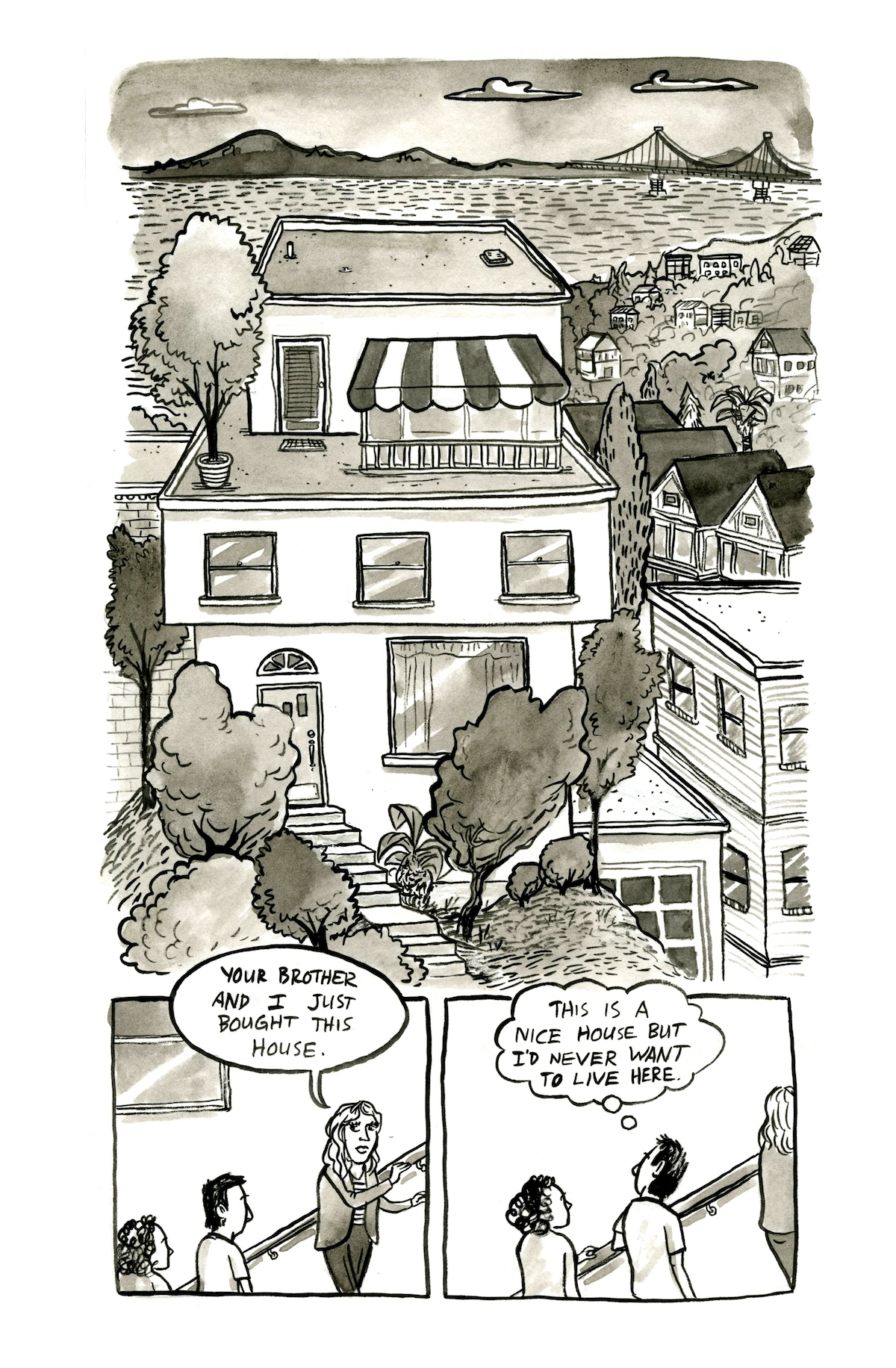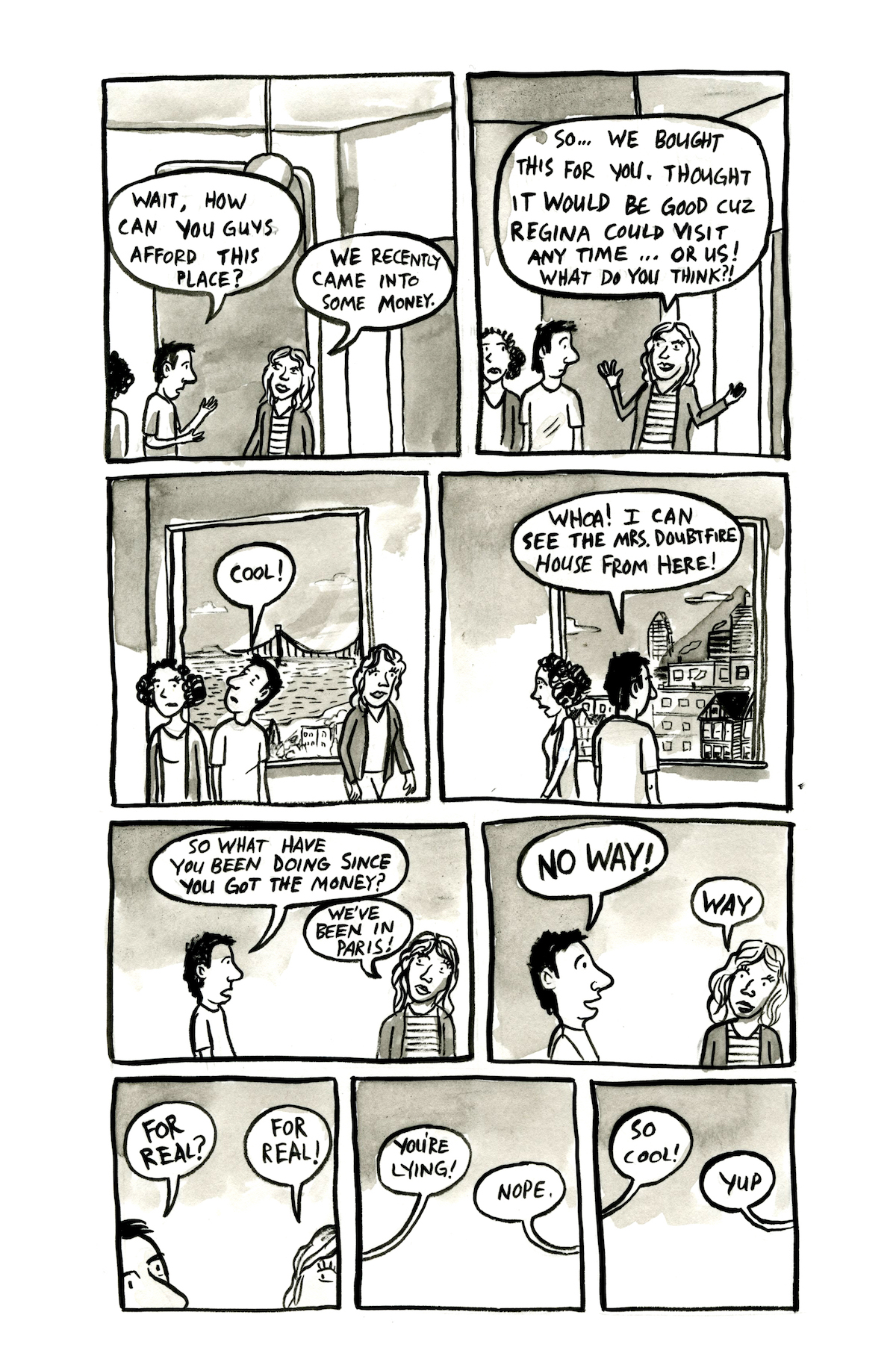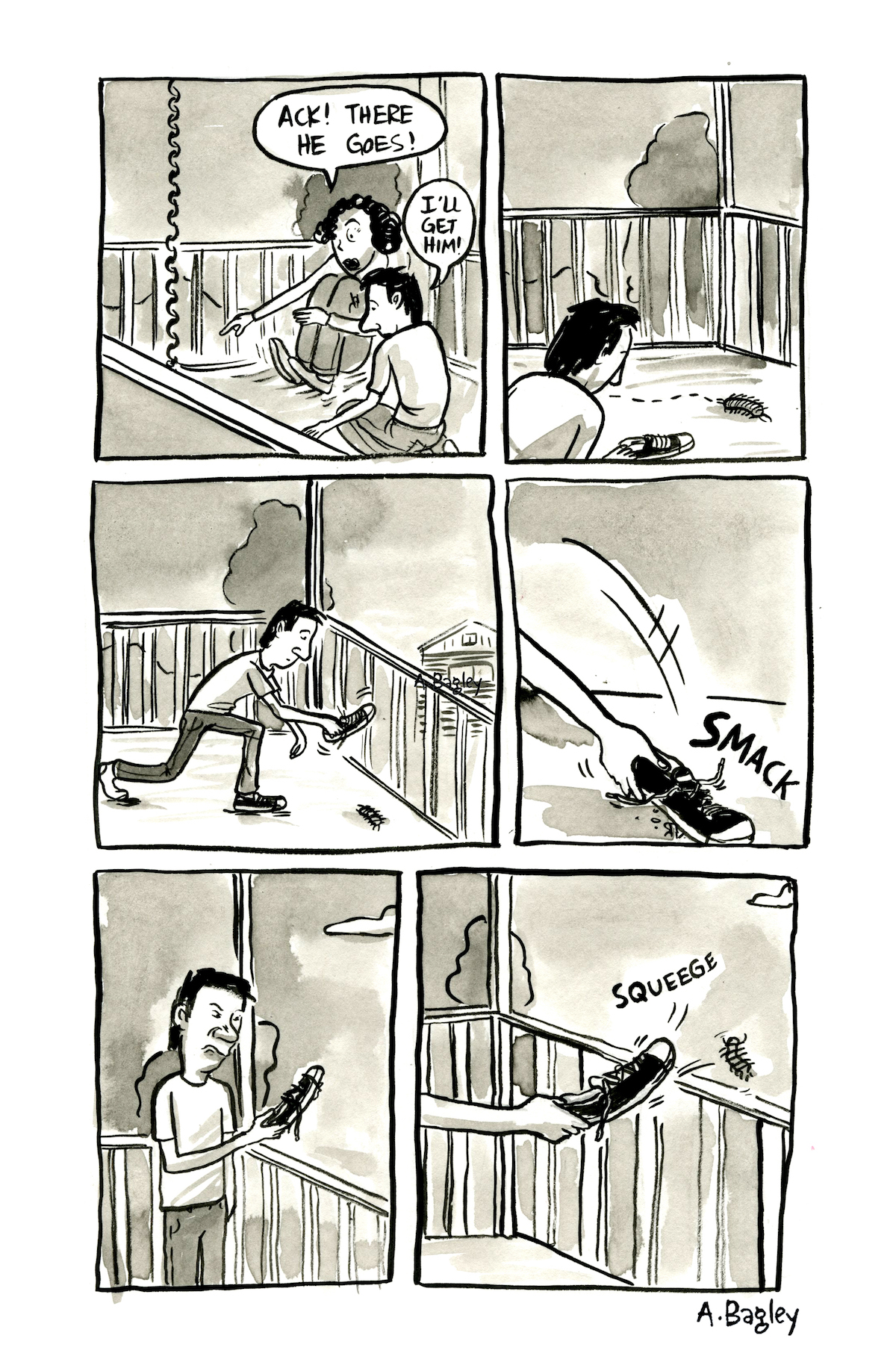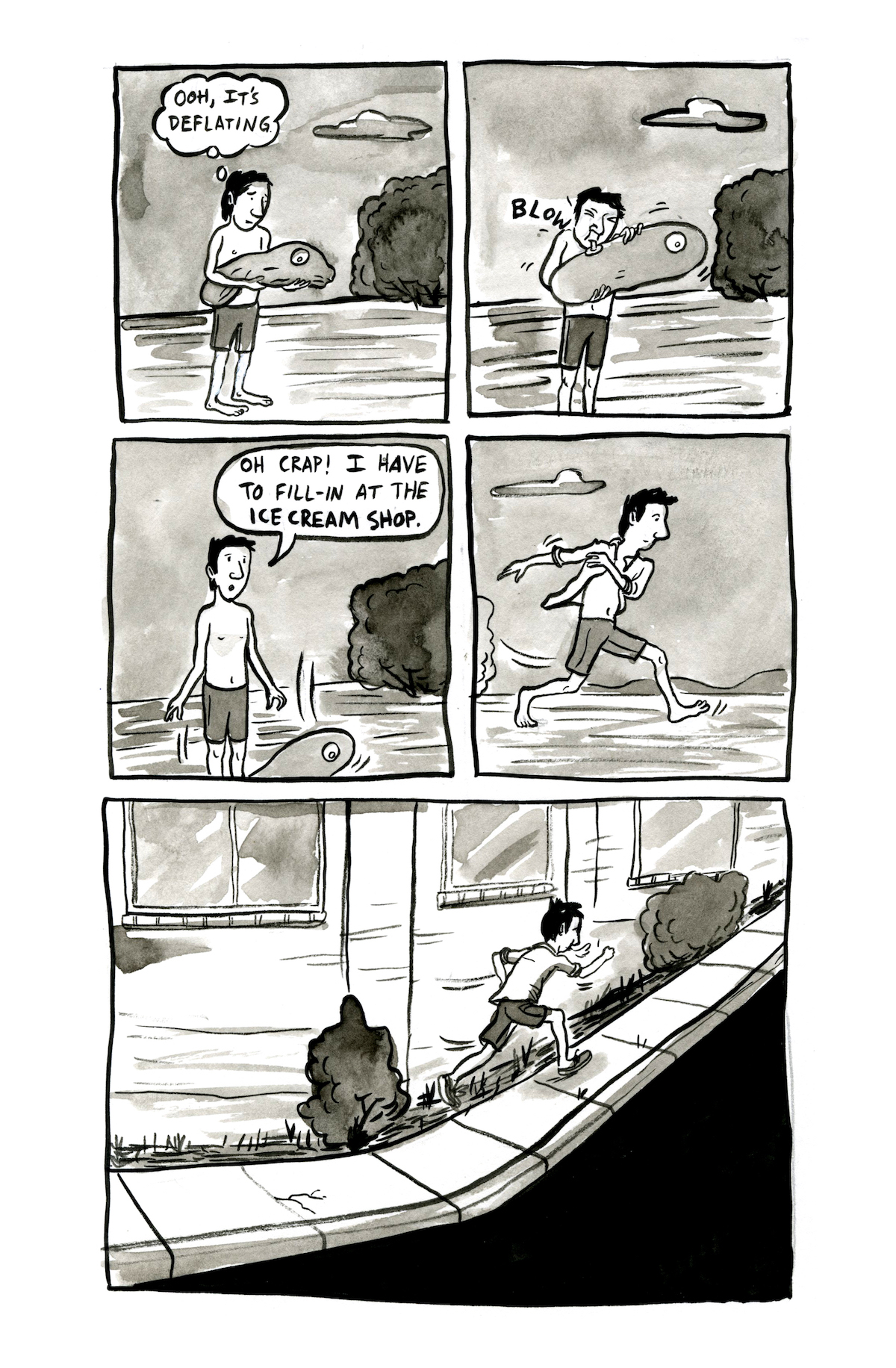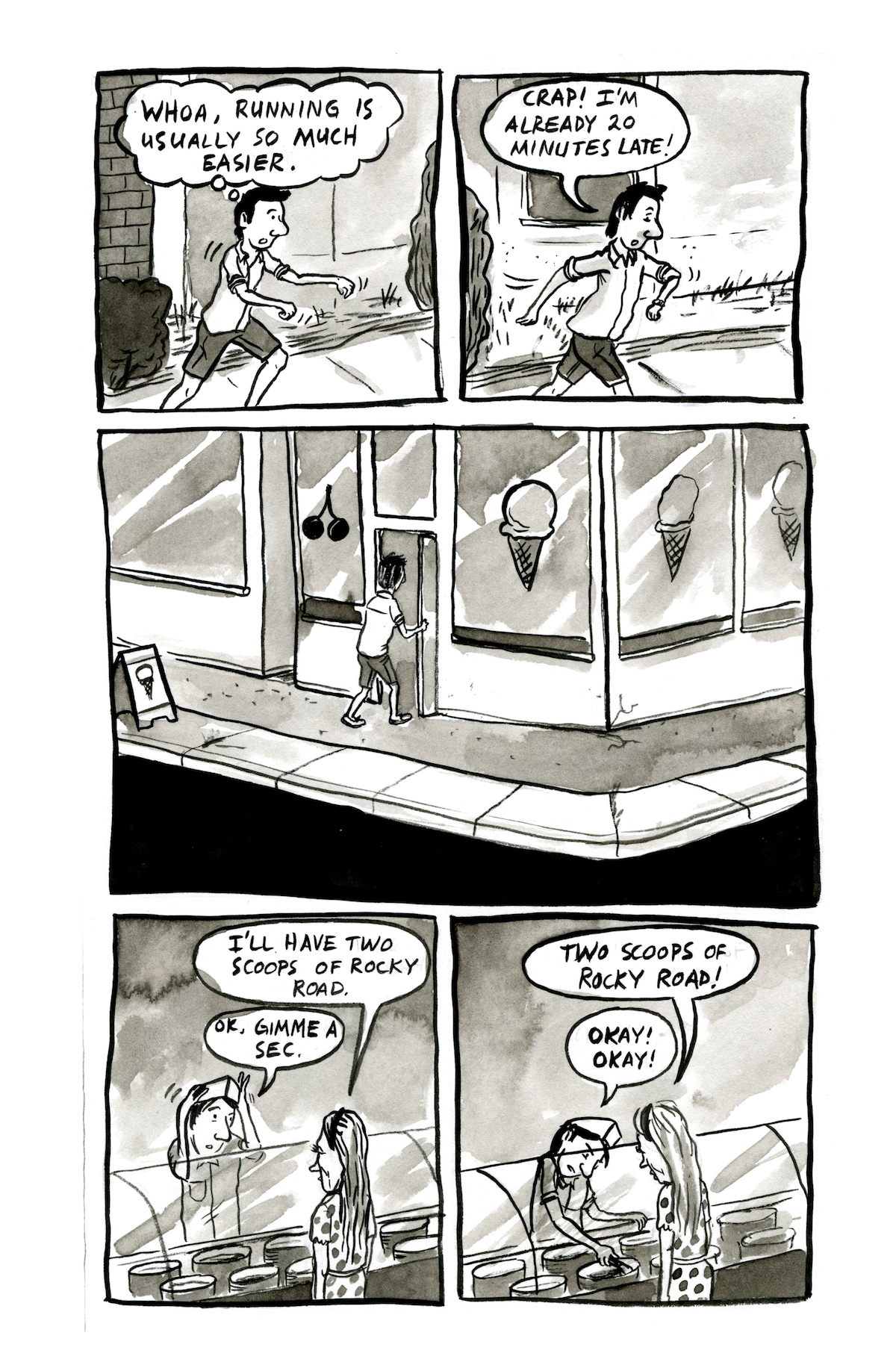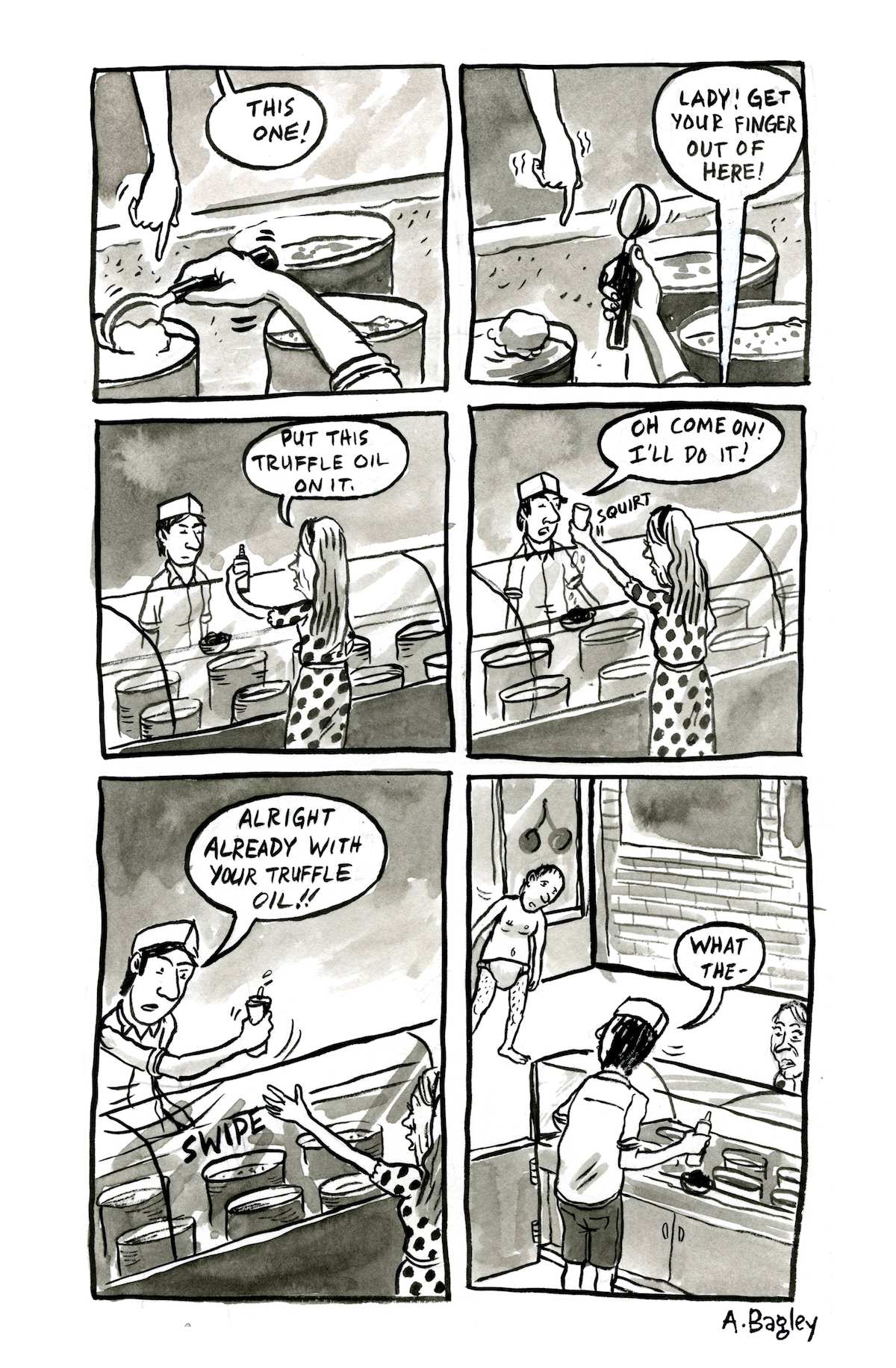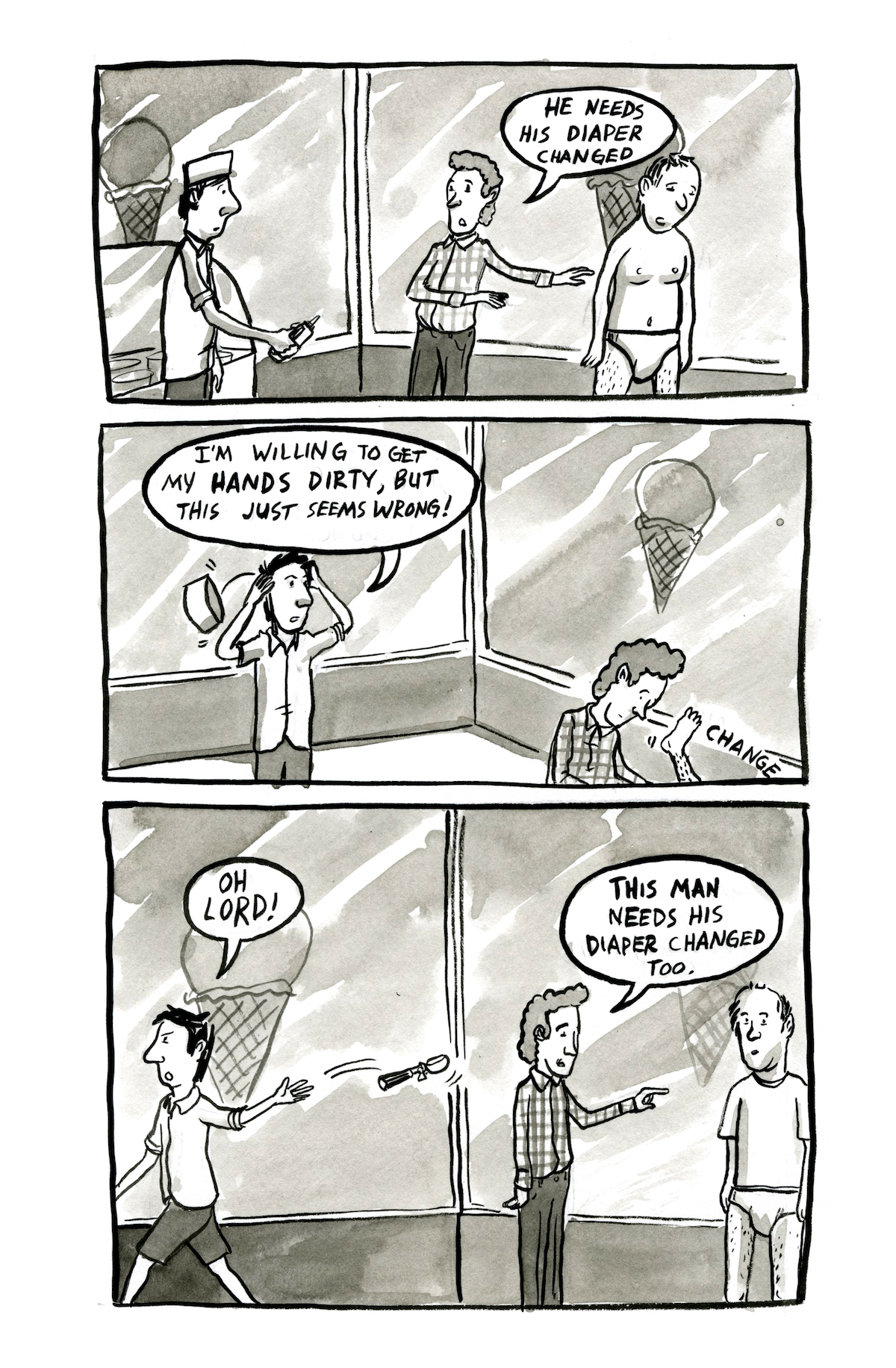The State of the Site: Year Three

Today is the third birthday of the Seattle Review of Books. One of the originating tenets of the site was: new writing every day. Every day, over the past three years, this is what we've delivered. Every day, something new, for you to read. Read, and we hope, enjoy.
We've run 271 reviews in that time. We've paid 155 writers, journalists, poets, and illustrators to bring critique, news, poetry, and reports from all corners of the book world. Occasionally, we antagonize some local authority. Mostly, we just write about how much we love books, and the people who write them, make them, read them, and sell them.
Our regulars are a treat: the spiderific advice of Cienna Madrid, the amazing, sweet, and colorful paintings of Christine Marie Larsen, the obtuse and scintillating dreams of Aaron Bagley, the thoughtful and mesmerizing post-it-notes of Clare Johnson, and, of course, our three columnists: Daneet Steffens, who covers murder and mayhem in Criminal Fiction, Nisi Shawl, whose view of science fiction in the Future Alternative Past is the one we most want to live in, and Olivia Waite, who has brought romance to these pages, where shocking little was before (when she came, we swooned at first read) in Kissing Books.
And I'd be remiss if I didn't mention the incredible contribution our Associate Editor Dawn McCarra Bass brings to the site daily. You may (and should) read her Sunday Post, but there is far more behind the scenes where her fingerprints are not visible to the reader.
Our sponsorship program is better than ever. We sell out our run each year. Those sponsors help pay for everything you see here, the talent and words of everyone who we are lucky enough to publish. The best part? The sponsorships are good. Do you yourself a favor and click through each week. You'll be impressed (maybe so much that you'd like to sponsor us yourself?), and may find your next event or read.
What does it mean to run a critical review website in 2018? When Paul and I first started the site, we talked a lot about reviews in the days of GoodReads, Amazon, and other capsule sites. There are quick takes and aggregated stars that tell you how much, on average, a book was enjoyed.
But what does an aggregate review mean, really? It can't tell you what you will enjoy, because you are not an average, you are a person with distinct taste and style. You probably love something that many people don't love. Our taste is personal, intrinsic, and wonderfully obtuse.
A star rating culled from one hundred individual ratings can only tell you, en masse, what a bunch of consumers think. It's a perfect capitalist way of thinking about books: little market forces that have a commodifiable enjoyment rating.
No one here denies that books are a business (and should be a business), but books are not widgets, sprockets, or dolls. They are one of the few products in the world that the form underplays the function. A flat of best-selling hardbacks at Costco looks soulless; the same book in your hand at night brings you a life other than your own. You cannot sum the joy of a well-turned sentence with three stars because the plotting was clunky. You cannot, in five stars, capture the sensation of your hands shaking when you close the last page of a book whose every moment was sublime.
A good review, on the other hand, can be read before one reads the book, and after. It is like re-reading a book through someone else's eyes. "Is good / Is bad" has nothing to do with it — what was the experience? How did it enthrall or disappoint the writer? How did it change them?
Over time, reading reviews from the same person or publication, you get to know their voice and their taste. You may not agree or feel that their flavor is your flavor, but you have a baseline and an understanding. You know when a reviewer you love reviews a book they love, that you should make the effort to seek it out.
One person, with a distinct voice, is an incredibly powerful thing. That's what we try to capture here. That's what our goal is. Are we reaching that goal? That's for you to decide. You can let us know.
One thing is certain: it is a privilege to be where we are sharing this with you. Thank you for reading — whether you've been here from day one reading the stellar interview with Nicola Griffith that launched us, or just joined us yesterday to read Paul's take on the latest issue of Wonder Woman. We are grateful for your attention — the one precious resource we each control exclusively — and we hope to earn it daily.
The Help Desk: Abridged, too far?
Every Friday, Cienna Madrid offers solutions to life’s most vexing literary problems. Do you need a book recommendation to send your worst cousin on her birthday? Is it okay to read erotica on public transit? Cienna can help. Send your questions to advice@seattlereviewofbooks.com.
Dear Cienna,
The good news is, I landed a good-paying freelance writing gig. The bad news is, it’s writing book recaps for a “study guide.” So, basically, Cliff’s Notes.
I happily agreed to take the job, but I’m wondering now if I should take it. Am I just making money off the backs of kids who don’t want to read The Crucible for school assignments? Will I be encouraging students to not read the classics?
Charlotte, Crown Hill
Dear Charlotte,
As I told the woman who agreed to nurse my latest clutch of spiderlings: relax, you're doing a public service. There's no consensus on what makes a book "classic," just as there's no guarantee that any book will resonate its readers. And frankly, some books are begging for abridgement. I dare you to find one person who has read Moby Dick cover to cover – every other chapter is straight whaling advice. And no healthy, well-adjusted individual picks up The Picture of Dorian Gray for funsies.
While I believe that most books hold value, uncovering that value is a delicate dance that some people don't have the time or patience for, just as I don't have the time or patience to explain to Gloria why she shouldn't be paid per 'ling – that's insane, there are thousands of them – she should charge me for the dry weight in spiderlings equal to the weight of one human child. (What I'm asking for is not unreasonable; the human nipple has many openings, enabling her to feed more than one 'ling at a time.) Who's right? I am, mostly. But how do we ensure that we both leave this arrangement satisfied? THAT REMAINS TO BE SEEN, GLORIA.
Your situation is much more cut and dry. You're making good money and for your potential readers, cutting through the tedium to have books succinctly explained is a treasure. Who knows, perhaps your recaps will pique someone's interest and they'll pick the book up themselves, eventually.
And if the whole recapping thing doesn't work out and you have a pair of working breasts, I may have a job for you.
Kisses,
Cienna
Portrait Gallery: Donna Miscolta
Each week, Christine Marie Larsen creates a new portrait of an author or event for us. Have any favorites you’d love to see immortalized? Let us know
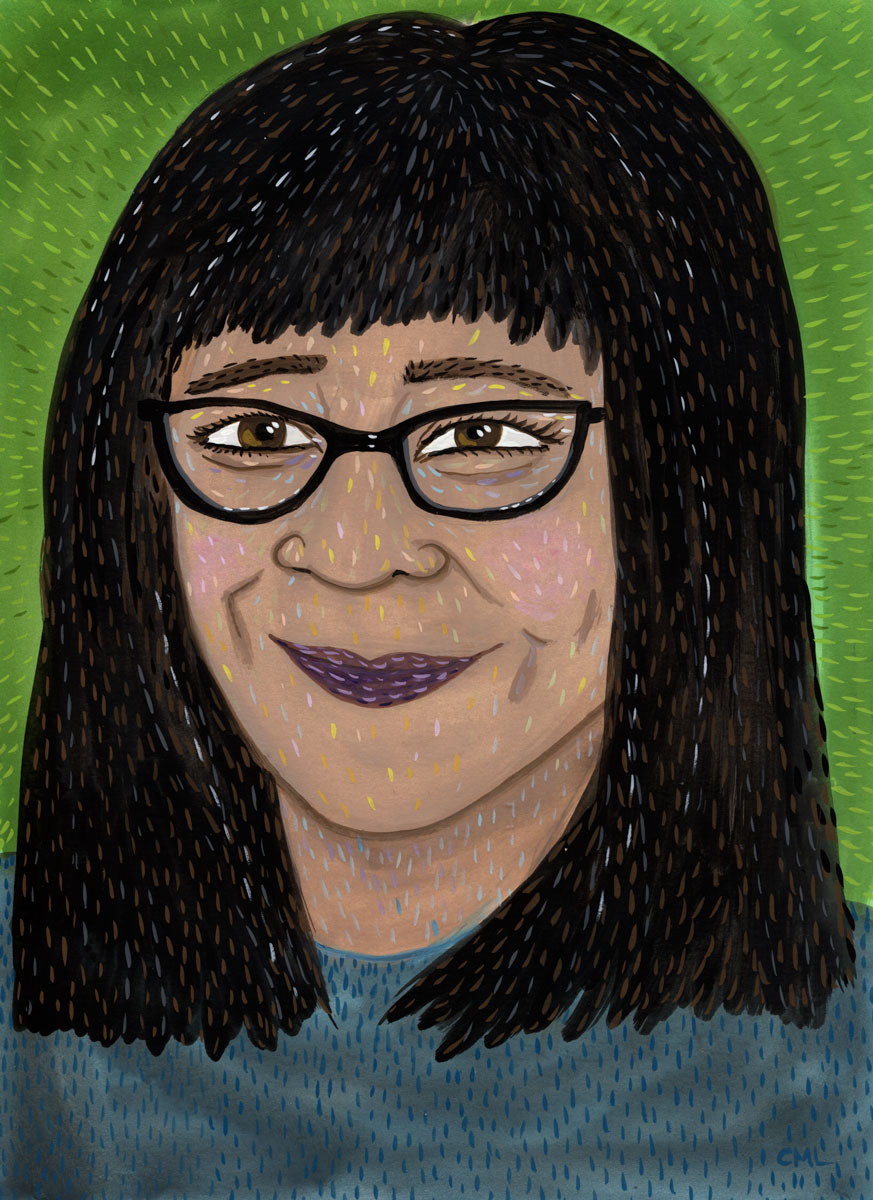
Saturday, July 28: Body Image, Identity, and Sisterhood
Local author Donna Miscolta, who is a frequent Seattle Review of Books contributor, will share excerpts from a draft of her upcoming novel, Ofelia and Norma and discuss identity and community.
White Center Library, 1409 SW 107th St, 243-0233 , https://kcls.org, 1:30 pm, free.
Criminal Fiction: Drowning in Summer's Cauldron
Every month, Daneet Steffens uncovers the latest goings on in mystery, suspense, and crime fiction. See previous columns on the Criminal Fiction archive page
Reading around: new titles on the crime fiction scene
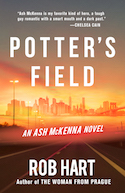
Rob Hart has stated that Potter’s Field (Polis) will be the final adventure of his heftily emotionally-baggaged freelance investigator Ash McKenna, so reading it was a bittersweet sensation: I meant to take my time and savor it slowly; instead, riveted, I bulleted through the novel in one sitting. Back on his home turf of Staten Island, Ash has every intention of heading on the straight and narrow. His short-and-to-the-point to-do, for example, list includes finding a place to live and getting a job, ideally as an apprentice to a real PI so that he can build his career properly this time around. Unsurprisingly – this guy is a magnet for misadventure – he lands neck-deep in an all-out drug war, not to mention tangling with old high-school frenemies. The music of Bronx River Parkway, the Die Hard movies, Casablanca, and pizza, lots of delicious New York pizza, lend Potter’s Field its McKennaesque feel, as does peripatetic Ash’s take-home realization: “Doesn’t matter where you live. It only matters how.”
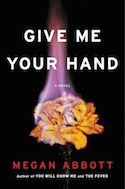
A teen friendship wrought over cross-country competitiveness and a love of science is both riven and cemented with a deep, dark secret in Megan Abbott’s Give Me Your Hand (Little, Brown). Kit Owens and Diane Fleming bond over high-school bunsen burners and deep-seated ambitions, but it’s as equally ambitious adults that the initial seeds of their relationship find full fruition in the cut-throat setting of a research laboratory. Abbott’s trademark elements of darkness in her complex protagonists shine here, with both Kit and Diane the most compelling of characters in equal measure.
Megan Abbott will be at the Lake Forest Third Street Books on July 30.
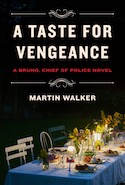
When a missing woman turns up dead in a bathroom and another body is found nearby, Bruno, chief of police in the delightfully food-and-wine-infused village of St. Denis, finds himself juggling a murder mystery and a local relationship mystery in Martin Walker’s A Taste for Vengeance (Knopf). As the murder evolves into a compelling tale of international intrigue, Walker also regales us with several cooking lessons and a tasty glimpse into an area of the world that’s reassuringly full of life, truffles, eggs, cheese, fresh vegetables, and plenty of fermented grape juice.
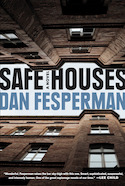
A cool and engaging spy thriller, Safe Houses by Dan Fesperman (Knopf), plays a long game, veering between recent-day America and 1979 Europe. Helen Abell, an operative in the CIA’s Berlin office is in charge of its local safe houses and takes her job very seriously. Studious, organized, and scrupulous in her check-ups, she’s startled one day by overhearing a meeting she had no involvement in planning. Then, when an unpleasant fellow spy makes extra trouble for the bureau, Helen has a conundrum on her hands. Years later, Helen’s daughter has her own adventure, uncovering the mystery of her mother’s secret life. Excellent page-turner, with incredible integrity at its heart.
The Quintessential Interview: Mick Herron
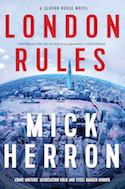
Another set of happily-rogue spooks infiltrate every inch of Mick Herron’s London Rules, number five in his terrific Slough House series, which kicks off with a breathtaking authorial set-piece, and only picks up pace from there. Central London’s Slough House may be where re-assigned (read: sent to the doghouse) MI5 agents cool their heels but, in this nest-of-spies particular case, these individual geniuses are never inactive for long. As clever and beautifully-plotted as a masterful John le Carré, and shot through with smart, canny humor.
What or who are your top five writing inspirations?
Need, curiosity, excitement, guilt, habit.
Top five places to write?
- One: My dining room table (north-facing chair).
- Two: My dining room table (south-facing chair).
- Three: No third place awarded.
- Four: No fourth place awarded.
- Five: No fifth place awarded.
Top five favorite authors?
Can’t do a top five. Could maybe do a top hundred, when time allows.
Top five tunes to write to?
- Keith Jarrett, Sun Bear Concerts: Osaka, Part I
- Arvo Pärt, Spiegel im Spiegel
- Bobo Stenson Trio, Don’s Kora Song
- Keith Jarrett, A Multitude of Angels: Torino, Part II
- Arild Andersen, Dreamhorse
Top five hometown spots?
- One: Summertown library.
- Two: Blackwell’s Bookshop (poetry section).
- Three: The canal, as it runs through Jericho, north Oxford.
- Four: The field near my home where deer graze in the evening.
- Five: My dining room table (see above).
Thursday Comics Hangover: Done in one
You'll rarely encounter a truly conclusive conclusion in superhero fiction. Everything is endlessly serialized, presumably under the assumption that a too-pat ending will inspire readers to drop off a title. All this inconclusiveness gets tiring.
And in an age in which every superhero story is collected in a trade paperback, comics have gotten even more endless. Decades ago, when a creator was late with a title, editors would reach into their back catalogs and pull out a one-shot story — meaning one with a beginning, a middle, and an end — they could plug into the scheduling hole. Often, these stories served as training wheels for up-and-coming talent, and many of them were...well, not good.
But every once in a while, a good one-shot story gets to the heart of a superhero, explaining in a kind of mission statement why the character matters and providing a blueprint for creative teams for years to come. This week, DC Comics published one of those rare comics, in Wonder Woman issue 51.
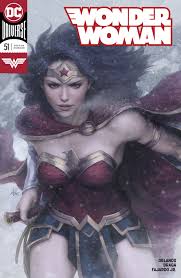
The basic premise is not original: Wonder Woman sends a criminal to prison, and then Wonder Woman continues to visit the prisoner over the span of months and years. At first, the prisoner is aggressive. Over time, their relationship gets more complicated. Author Steve Orlando isn't reinventing the wheel, here.
But unpredictability is not the charm of the story. Orlando's script is warm and patient, and artist Laura Braga deftly straddles the line between superhero comics and the expressive character work. You know how it's going to end, but you can't wait to get there.
Way too often, Wonder Woman is presented as nothing more than the female version of Superman, or a generic powerful hero who happens to be a woman. Braga and Orlando in one issue manage to explain what it is that makes Wonder Woman a unique character, and to establish a precedent for creators in the future. She doesn't just vanquish crime; she rehabilitates criminals. Hopefully, Seattle author G. Willow Wilson, who recently was announced as the new writer on Wonder Woman, will expand on the themes of this story, to give a new purpose to the never-ending adventures of Wonder Woman.
And since we're already talking about how to cover toxic people, this is the only interview with Sean Spicer about his memoir that I ever want to see:
BBC interviewer to Sean Spicer: "You have corrupted discourse for the entire world by going along with these lies" pic.twitter.com/HsvNLajwQu
— Robert Maguire (@RobertMaguire) <a href="https://twitter.com/RobertMaguire/status/1021878074407837698?ref_src=twsrc%5Etfw">July 24, 2018
Something to remember as more and more White House memoirs come out of this horrible administration: These people are complicit in something terrible. They do not deserve a softball interview. Call them to account for what they've done
It's a bird! It's a plane! It's a backlash against diversity in comic books. pic.twitter.com/kTSOUV89U7
— Jim Jefferies Show (@jefferiesshow) July 25, 2018
From Star Wars to comics, fandom has become toxic. White men are demanding that corporate entertainment maintain the white-men-centric focus that it's supported for all of history, and they're using the equivocating rhetorical language of the internet to leverage their minority opinion onto major platforms.
That said, I like this Jim Jefferies piece about the anti-diversity crowd: Jeffries exposes the losers for what they are, he throws their words back in their faces, and he shames them. I hope the media is paying attention. If you're going to write a story about these troglodytes, this is how you do it — not by engaging in weak-kneed both-sidesism.
The future is Kamari Bright
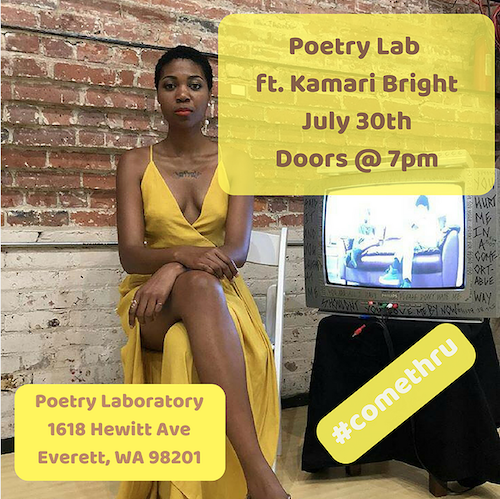
"I would say my entryway into poetry was probably through music," our July Poet in Residence, Kamari Bright, tells me over the phone. "I loved R&B and Motown and a kid. From there, getting to see the artistry in lyricism, I remember starting to write songs and then poetry." That love of music certainly shows in Bright's performance. When she reads a poem aloud, Bright brings a certain rhythm and stage presence to the material that recalls a musical performance.
That onstage confidence seems to be a natural talent: aside from some experience performing in choir at Fisk University in Nashville, Bright doesn't have a theatrical background.
"I don't remember how I first started" performing poetry, Bright says, but "I do remember there was a big shift in the extent to which I first started to share. I had a few family members pass within a short time. It hit me hard, and I started to think about my legacy and the traits that I wanted to leave behind." When reminders of your mortality get "right in your face," she says, "that reminder that you don't know how much time you have here," stage fright tends to disappear.
Bright is a multidisciplinary artist — her website documents music, theater, film, and visual art projects — but she thinks of herself as a poet first. "I think poetry has a certain simplicity and an accessibility to it," she says. "With other art forms, there are different barriers. You have to get supplies, and you need money." But with poetry, you need "pen and paper, maybe a phone. And if I want to share, I can just put it out on the net. It's really accessible."
As you can tell from the poems she's published on our site this month, Bright is using poetry to examine her religious upbringing. "I think a big part of writing is to help me process things and reflect or make sense of something. Writing those poems came as I was trying go understand my deviation from Christianity," she says.
"I was raised very Baptist on both my mom's side and my dad's side. I didn't start to question it until college. I started to research some things about Christianity and the Bible and other religions, and I realized I don't believe all this in the way it's been taught to me and so I can't truthfully call myself a Christian anymore."
Her poems examine "the process of interpreting all the parts of the Bible that have been detrimental to myself and other people. It's not about attacking the belief or the spirituality itself," she clarifies, but rather studying "what part of it has been influenced by man," and how subjective religious interpretation can be.
Bright doesn't hesitate to name poets who've been an influence on her: "I love Anastacia-Renee, and probably one of my favorite poets is Nikki Giovanni. I like the authenticity of their voices."
Where does Bright see herself in relation to the Seattle poetry scene? "I'm probably still trying to find my place," she admits. "There's a lot of stuff I'm still learning about poetry in general, but I do think once you're in it, it's easy to keep moving further on." The literary community in Seattle "doesn't feel impenetrable."
Ask Bright what she wants out of her career, and she's clear about her aspirations. "I know this is kind of a taboo thing in poetry, but I want to be able to live off of this craft. I want to not have to supplement poetry with a nine-to-five day job. I want to publish another book and get the chance to travel." Her goal, she says, is to "take this wherever people want to hear it."
Book News Roundup: Hugo House brings on new Fellows, Town Hall is hiring an election correspondent
- Here's something cool: Town Hall Seattle is hiring a 2018 Election Correspondent. I very much like this clarification of the role:
Town Hall does not require false-equivalency or “both-sides-ism” journalism. We appreciate and understand that applicants will have values and points of view. These are entirely appropriate as long as they are disclosed. This is not, however, an advocacy-journalism opportunity and applicants must not be affiliated with a specific campaign on the 2018 ballot, and must be willing to fairly and accurately engage with different points of view.
The 2018-19 Made at Hugo House Fellows are Courtney Bird, Emily Dhatt, Emily Dhatt, Kim Kent, Katrina Otuonye, and (SRoB contributor) Dujie Tahat. The Made at Hugo program brings together promising writers and offers them full access to the House's full range of resources — from classes to events — and encourages them to work together as a peer group to develop their work. Read more about all the fellows here.
Over the weekend, a dumb online magazine that allows any dipshit to publish an article with them ran a horrible clickbait piece about libraries. I'm not going to link to the article — or a cache of the article, since it was eventually removed because it was so dumb — but I am going to link to two great local defenses of libraries. First, Curbed Seattle published a great account of every service that the Seattle Public Library provides. Second, Seattle Magazine wrote about SPL's transition to a digital age. Please read those pieces, and please don't read clickbait that assholes post to the internet. To some dishonorable publishers out there, hate-clicks count as real clicks, so they keep diving deeper towards the bottom of what's considered acceptable in public discourse in order to keep their advertisers happy. Please stop clicking, stop referring to them by publication name, and stop talking about them.
There was not a lot of actual news out of the San Diego Comicon last weekend. But here's a local-angle story you might have missed: Fantagraphics is bringing back the print edition of its comics criticism magazine, the Comics Journal. This is the magazine that introduced me to the idea of literary criticism back when I was a kid. So now you know who to blame! Hopefully, CJ will do a better job of representation this time around; the magazine was always pretty bro-y, back in the day.
The walking dead
Published July 24, 2018, at 12:01pm
In a world where people can live forever, why would anyone bother to live at all? Rachel Heng reads from her debut novel about death and dystopia tonight at Elliott Bay Book Company.
The Garden
And in that moment
when he saw her
partake of the angel that
was the “forbidden fruit”
of the tree of God,
Adam realized he
was inadequate.
Naked.
He saw what the woman
pulled from his body
knew long before, that
he was dim and
dirt-made. That the angel
was her own piece of
forever to consume, while
he was merely her
limitation in paradise.
And Adam felt the heave
of less-than like the first
heart that ever broke,
then told Eve to
put some fucking clothes on.
AHOY Comics is coming!

Boy howdy, are you ready for this? Sponsor AHOY comics is launching soon, in September, and are we ever chuffed. This new publisher will knock your socks off — they say it best “To us, a good comic magazine is well-crafted, one-of-a-kind, and funny.”
The first two titles, The Wrong Earth, and High Heaven are amazing — you can check out the first six pages of High Heaven on our sponsor’s page.
We’re so grateful to sponsors like AHOY Comics for supporting the site and helping us publish great writing about books every day. Hats off to them, and all of our sponsors. Did you know our 2018 sponsorships are almost sold out?. We’d love to see your book, event, or service for writers promoted here — reserve a slot before they’re gone!
Your Week in Readings: The best literary events from July 23 - July 29
Monday, July 23: Inside Witnesses
In 2013, a man with a gun walked into the Twilight Exit bar and shot his gun. Local journalist Marti Jonjak happened to be in the bar that night, and ever since she's devoted a considerable amount of effort to documenting exactly what happened on that evening and why. Tonight, she'll appear in conversation with one of the other witnesses at the shooting. University Book Store, 4326 University Way N.E., 634-3400, http://www2.bookstore.washington.edu/, 7 pm, free.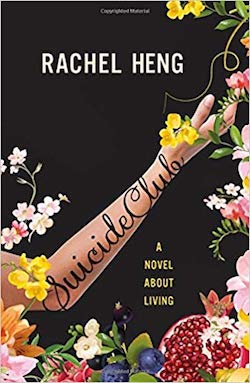
Tuesday, July 24: Suicide Club Reading
Rachel Heng's debut sci-fi novel, Suicide Club, imagines a future in which humans live long — maybe even endless — lives. It's a beautiful, inquisitive, adventurous novel that uses sci-fi to examine our obsessions with youth and mortality and self-control. I'll be interviewing Heng onstage at this reading. Elliott Bay Book Company, 1521 10th Ave, 624-6600, http://elliottbaybook.com, 7 pm, free.Alternate Tuesday, July 24: Ellen Datlow
Because I'm involved with the Rachel Heng reading, I'm offering another event with no conflict of interest for you to consider. As part of sci-fi writing organization Clarion West's summer reading series, sci-fi writer and editor Ellen Datlow. She's worked at OMNI Magazine and Tor.com and she's probably edited some of your very favorite science fiction authors. University Book Store, 4326 University Way N.E., 634-3400, http://www2.bookstore.washington.edu/, 7 pm, free.Wednesday, July 25: Beginner's Luck Reading
Malcolm Terence, a reporter for the Los Angeles Times, headed out in the aftermath of the Love Generation to join up with a back-to-the-land commune. As the pastoral dream died, people eventually wandered off and tried to reconcile their dreams with reality. This book tells that story. Elliott Bay Book Company, 1521 10th Ave, 624-6600, http://elliottbaybook.com, 7 pm, free.Thursday, July 26: Stay with Me Reading
Nigerian author Ayobami Adebayo's debut novel is finally out in paperback. It's about a wife whose husband brings home a second wife after some marital discord. Adebayo wrote part of her book at Hedgebrook, Washington's amazing women's writing organization. Elliott Bay Book Company, 1521 10th Ave, 624-6600, http://elliottbaybook.com, 7 pm, free.Friday, July 27: South Asian Writers of the Pacific Northwest
Local writers including Jordan Alam, Sasha Duttchoudhury, Jasleena Grewal, Shankar Narayan, and organizer Sonora Jha read and discuss what it means to be a writer of South Asian descent in this part of the world. Hugo House, 1021 Columbia St., 322-7030, http://hugohouse.org., 7 pm, free.Saturday, July 28: Body Image, Identity, and Sisterhood
Local author Donna Miscolta, who is a frequent Seattle Review of Books contributor, will share excerpts from a draft of her upcoming novel, Ofelia and Norma and discuss identity and community. White Center Library, 1409 SW 107th St, 243-0233 , https://kcls.org, 1:30 pm, free.Sunday, July 29: I Am Still Alive Reading
See our Event of the Week column for more details University Book Store, 4326 University Way N.E., 634-3400, http://www2.bookstore.washington.edu/, 2 pm, free.Literary Event of the Week: I Am Still Alive reading at University Book Store
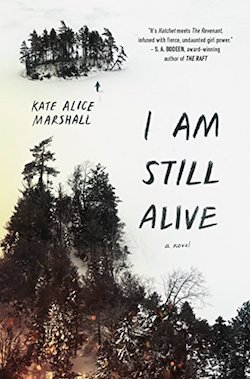
If you're in the mood for an action-packed survival tale, Washington novelist Kate Marshall's I Am Still Alive should be at the top of your list. This is perfect summer reading: the story of a teen named Jess who struggles to survive, with the help of a dog, in the cold Canadian wilderness.
Alive is split into two interwoven narratives. The first is narrated by Jess, still reeling after her mom's accidental death, as she heads to an off-the-grid part of Canada to live with her reclusive dad. And the second is narrated by Jess after a catastrophe: her father is dead, his cabin is gone, and Jess has to figure out how to survive if she's going to get revenge.
This is fun, exciting stuff — and it's also great for young readers. The story unspools through the braided narrative, and readers can slowly piece together the climax of the book through context clues. Jess faces two distinct conflicts over the course of Alive: First, she has to learn to get along with her absentee dad and adjust to extreme rural life. And next, she must figure out how to keep the world from killing her.
Marshall clearly knows her nature. Even the cruelest parts of Alive will make you want to pack up the tent and head for the wilderness. Jess's indomitable spirit is contagious; she reminds readers that no problem is too great to overcome. All you need is brains, endurance, and a ferocious need for revenge.
University Book Store, 4326 University Way N.E., 634-3400, http://www2.bookstore.washington.edu/, 2 pm, free.
The Sunday Post for July 22, 2018
Each week, the Sunday Post highlights a few articles we enjoyed this week, good for consumption over a cup of coffee (or tea, if that's your pleasure). Settle in for a while; we saved you a seat. You can also look through the archives.
Five women accuse Seattle’s David Meinert of sexual misconduct, including rape
Sydney Brownstone reports on accusations of sexual misconduct against well-known Seattle figure Dave Meinert for incidents ranging over 15 years. This isn’t just a story about allegations of shitty, coercive behavior and worse; it’s also a well-crafted narrative about gaslighting and power — how Meinert’s public persona, progressive and vocal on women’s issues, may have protected him by increasing the inequity of credibility that already favors affluent, high-status men.
Here’s the thing: invading another person’s body has never been okay — as a society, we’ve never said that. What we’ve said (and still do) is that some people have less personhood than others, so invading their bodies is less bad. And if you chose to take advantage of that? Your mistake wasn’t failing to understand the harm you were doing. Your mistake was failing to treat another person like a person. Your mistake was failing to care.
The nuanced, careful reporting in this article is the best kind of counternarrative. Men like Meinert still may not care, but they can be held accountable. Kudos to Brownstone for helping us get there.
The woman decided to file a police report in part because of a Facebook post that Meinert had written on the #MeToo movement — the same post that rankled the business woman who accused him of rape.
Meinert’s post said he wanted his friends to know their sexual assault stories were being heard, and that he was “making a commitment to be more aware and never become complacent or apathetic to this issue.” The post was liked by nearly 200 people.
Meinert’s college friend was amazed by what she believed to be the post’s total lack of self-awareness. In that moment, she wondered if there were others like her.
On Becoming a Person of Color
Rachel Heng is in Seattle this week, touring for her debut novel, Suicide Club. Here’s some pre-reading for those who can attend, and a consolation prize for those who can’t: her essay about becoming other, as a girl growing into a woman, and as a transplant from Singapore to the United States, and the complexity of being seen through multiple lenses, including your own.
When I am called a person of color in America, what do people see? Do they see the invisible privilege of being foreign-born, of having come from a country that afforded me the upward mobility my life benefits from? Do they see that while the color of my skin today renders me a minority in America, I spent most of my early life an oblivious, privileged ethnic majority? Racial privilege in Singapore, like anywhere else, is complex and multi-faceted. The Chinese enjoy certain advantages for being the majority, but this can be further broken down into dialect group, fluency in English and class, with English-speaking Peranakans historically being at the top of the pecking order. While not raised within this specific sub-segment of privilege, through education, I now undoubtedly belong to it when I am in Singapore.
But I do not live in Singapore. I live in America, where on more than one occasion, I have been told to go home. Even as the familiar rage quickens my pulse and makes my hands turn cold, a part of me feels guilty. I think to myself: you, you with all your invisible privileges, who are you to be angry?
Lane Davis's Civil War
Lane Davis lived on Samish Island in his parents’ home, unemployed and by his own assessment without many prospects. But much of his life was lived online, “shit-talking on the internet,” researching, and writing for 4chan-ish sites like The Ralph Retort. Then his anger crossed the thin line between virtual and physical realities, and an altercation with his father ended in murder. A tragic story, reported by Joseph Bernstein, about how hard it is to tease apart the merely awful from the dangerously unstable in the perpetual adolescence of the internet’s alt-right communities.
Writing under the name “Seattle4Truth,” Lane was an indefatigable culture warrior and a wildly inventive conspiracist. He left a footprint online as wide and weird as his imprint on the physical world was small and sad: hundreds of YouTube videos, thousands of tweets, hundreds of blog posts, hundreds of Reddit comments, and most of all years of chats — Slack messages and Google Hangouts — with his fellow travelers.
But none of those people, the ones who called him Seattle, the ones who called him a friend, had met Lane in person. None of them knew, nor would most of them know for months, what he had done to his father. And none of them had any idea what this man they spent all day online with was capable of.
Including me.
Whatcha Reading, Tom Nissley?
Every week we ask an interesting figure what they're digging into. Have ideas who we should reach out to? Let it fly: info@seattlereviewofbooks.com. Want to read more? Check out the archives.
Tom Nissley is a lot of things: author of the fascinating A Readers Book of Days: True Tales from the Lives and Works of Writers for Every Day of the Year, eight-time Jeopardy! champion, and owner of the delightful, and well-loved, Phinney Books. If you like any of his recommendations, it would be only fair to go order them up from Phinney Books, and be sure to check out their awesome Phinney by Post program.
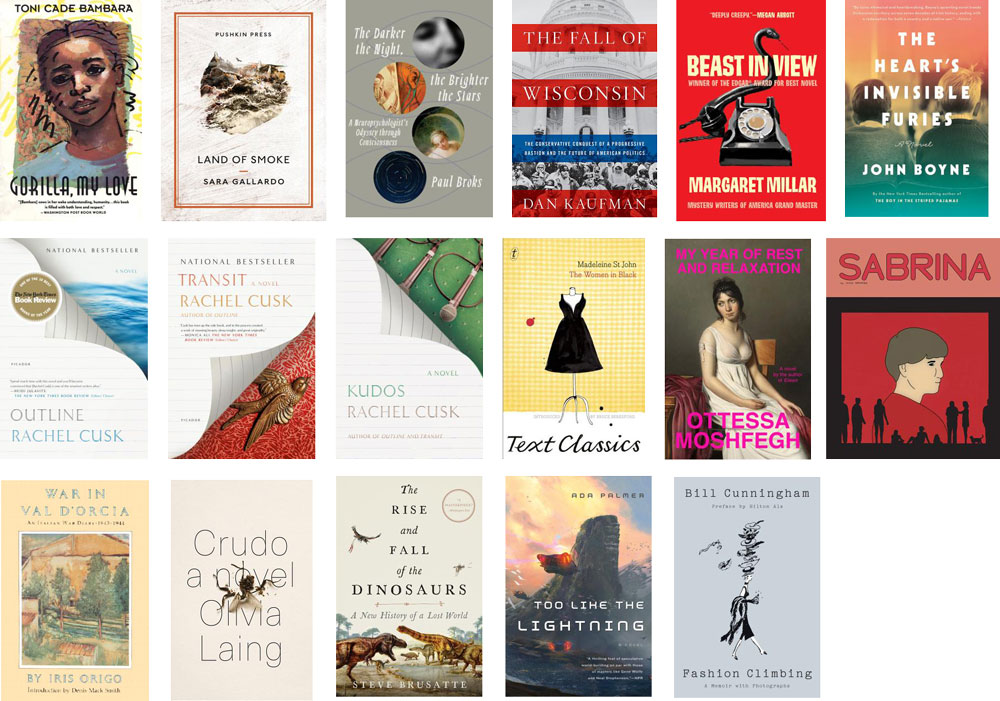
What are you reading now?
There are two kinds of reading I like best: when I'm so far into a good book that I put everything else aside (ha! not likely) and just turn the pages, and when I'm juggling a few good books, going back and forth between them. Right now I'm happily doing the latter. I've just started two books of short stories, Toni Cade Bambara's Gorilla, My Love and Sara Gallardo's Land of Smoke, and have one longer book, Paul Broks's The Darker the Night, the Brighter the Stars: A Neuropsychologist's Odyssey Through Consciousness, poised to join them. Gorilla, My Love's been in the back of my mind to read for decades (it came out in 1972), but once I actually read the "Sort of Preface" that starts things off (go read it yourself — you can find it on Amazon) there was no going back, and the first two stories have not disappointed. And I had no expectations for Land of Smoke (by an Argentinian writer, written around the same time as Bambara's stories but only now translated into English), and had even forgotten I had ordered it for the store, but once it arrived, as a beautiful little Pushkin Press paperback, I couldn't help but pick it up and look through it, and once I had read the strange and confident openings to a few of the stories, well, see above, re: no going back. And The Darker the Night? Again, a book I had forgotten even ordering for the store, but somehow it talked its way into my book bag when it arrived. It appears to be a mix of memoir, science, and philosophy, a combo that might be tough to pull off, but I think it might be good, and just right for my current heightened sense of mortality and general doom.
What did you read last?
I just finished Dan Kaufman's The Fall of Wisconsin, a book about how that state went from Fighting Bob La Follette to Scott Walker, which was useful and sad-making, though he was trying his best, in good Wisconsin style, to be optimistic. And before that, I was on vacation and read two disappointing books (Margaret Millar's The Beast in View, a "crime classic" I had high hopes for but was too dated (multiple personalities!!), and John Boyne's The Heart's Invisible Furies, a John Irving-style over-the-top epic that so many of my bookish friends have loved but just wasn't for me) and two I loved: Outline, the first in Rachel Cusk's recently completed trilogy, which somehow makes a non-story about the people a writer meets while flying to Athens to teach a workshop into a totally compelling read, and The Women in Black, a perfect little comic novel from Australia about the employees in the Ladies Frocks department at a Sydney department store in the '50s. It's the most charming thing I've read in ages.
What are you reading next?
The list is long, and, as always, will end in failure, but I am certain I will at least read the other two (Transit and Kudos) in Cusk's trilogy by the end of the summer. Also on the list (some catching up, some trying to get ahead): Ottessa Moshfegh's My Year of Rest and Relaxation, Nick Drnaso's Sabrina, Iris Origo's War in the Val d'Orcia, Olivia Laing's Crudo, Steve Brusatte's The Rise and Fall of the Dinosaurs, Bill Cunningham's Fashion Climbing, and whatever poems my friend Josh Feit posts at Opposite Hex.
Mail Call for July 19, 2018
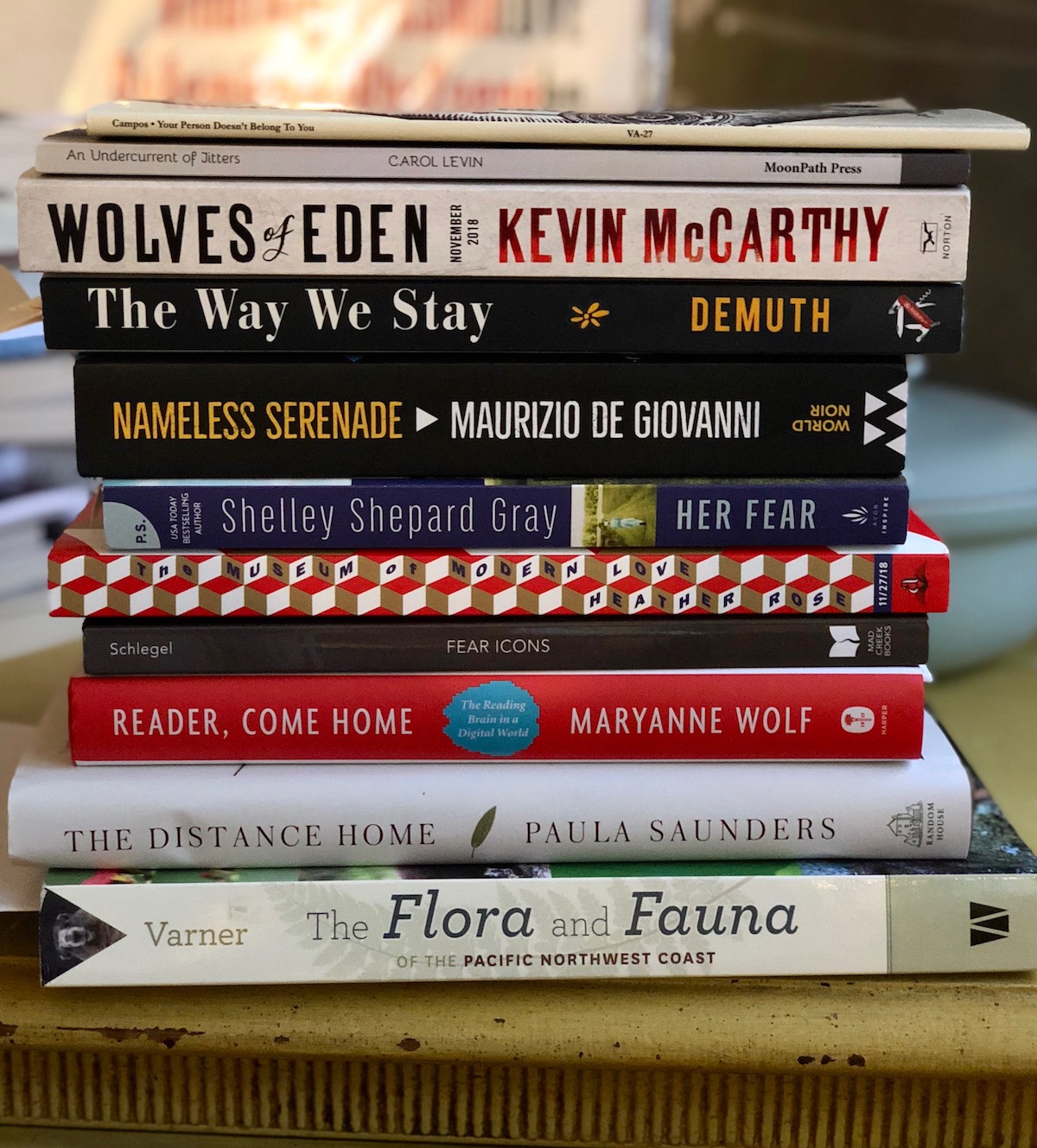
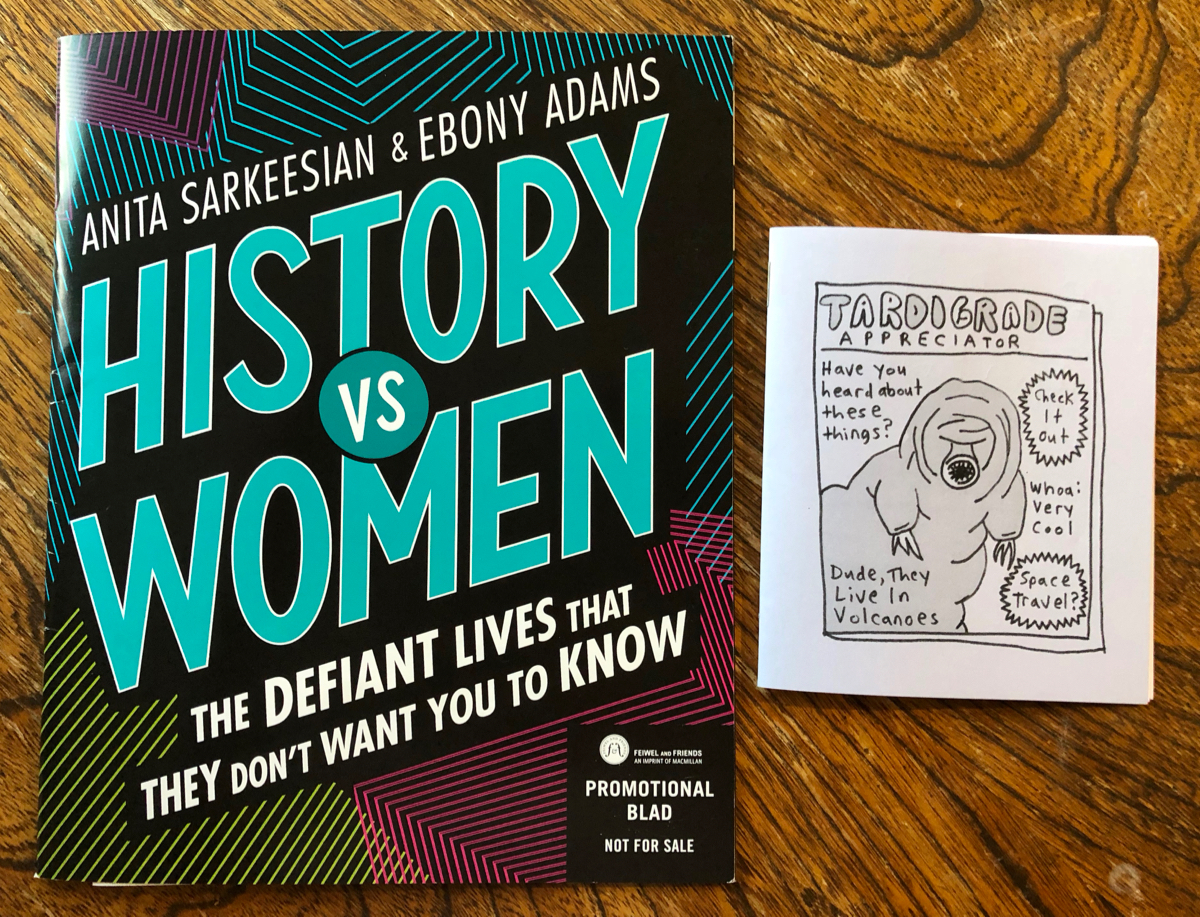
pitches for reviews. We’d love to hear from you — maybe on one of the books shown here, or another book you’re passionate about. Wondering what and how? Here’s what we’re looking for and how to pitch us.
Portrait Gallery: Summer Reading
Each week, Christine Marie Larsen creates a new portrait of an author or event for us. Have any favorites you’d love to see immortalized? Let us know
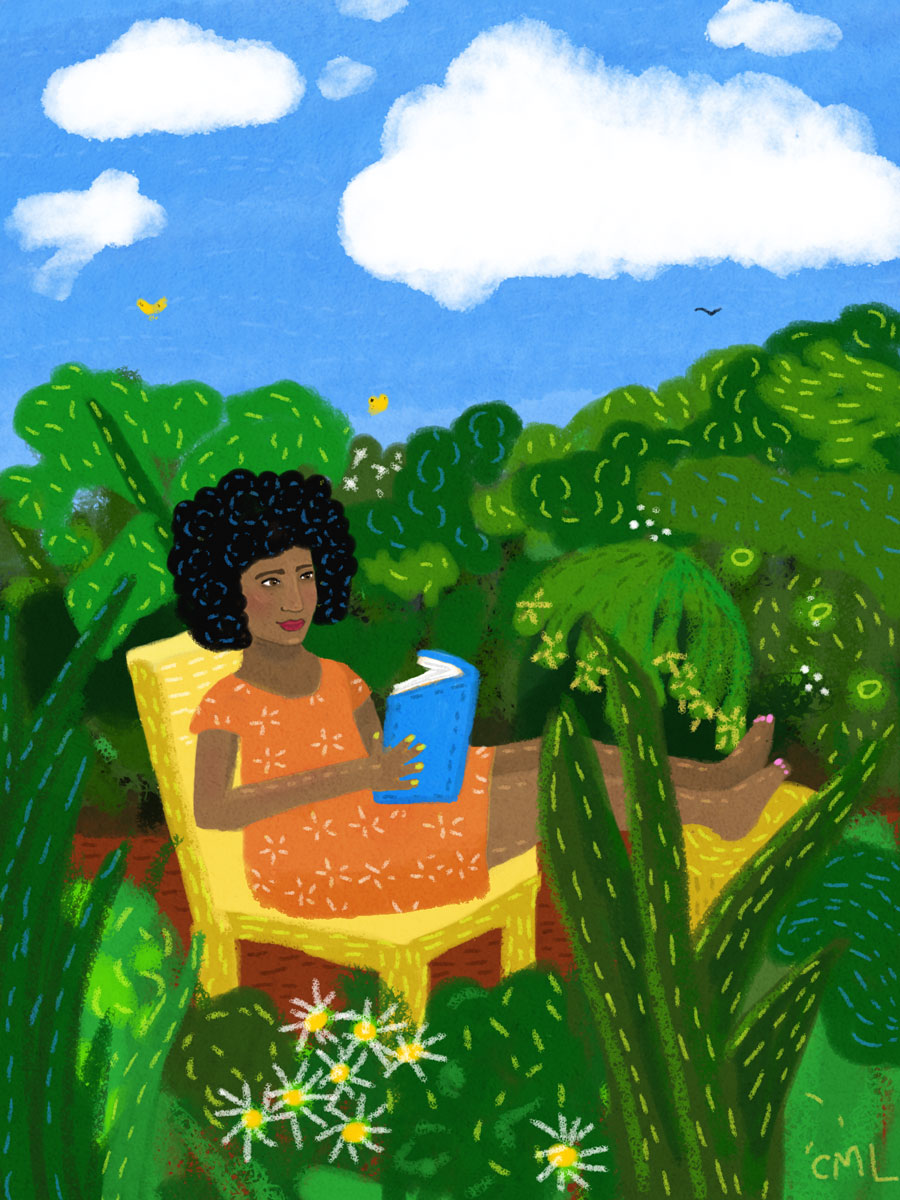
Summer Reading
Summer is here. It is time. Find your space and spend a few minutes with a book.
